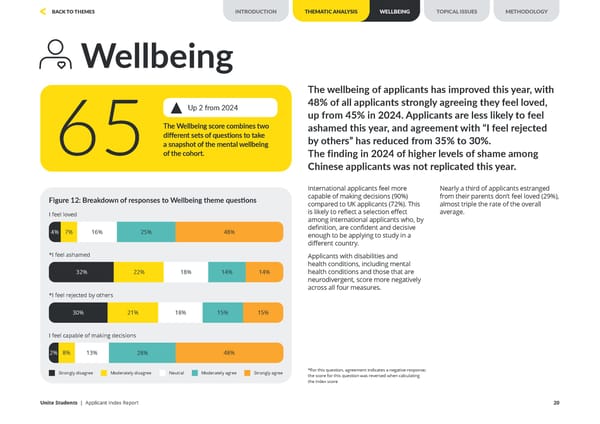8% 13% 28% 2% Wellbeing *For this question, agreement indicates a negative response; the score for this question was reversed when calculating the index score I feel loved 7% 16% 25% *I feel ashamed *I feel rejected by others I feel capable of making decisions Strongly disagree Moderately disagree Neutral Moderately agree Strongly agree Figure 12: Breakdown of responses to Wellbeing theme questions The Wellbeing score combines two different sets of questions to take a snapshot of the mental wellbeing of the cohort. 65 The wellbeing of applicants has improved this year, with 48% of all applicants strongly agreeing they feel loved, up from 45% in 2024. Applicants are less likely to feel ashamed this year, and agreement with “I feel rejected by others” has reduced from 35% to 30%. The finding in 2024 of higher levels of shame among Chinese applicants was not replicated this year. 4% 21% 18% 15% 15% 48% 48% 22% 18% 14% 32% 14% 30% International applicants feel more capable of making decisions (90%) compared to UK applicants (72%). This is likely to reflect a selection effect among international applicants who, by definition, are confident and decisive enough to be applying to study in a different country. Applicants with disabilities and health conditions, including mental health conditions and those that are neurodivergent, score more negatively across all four measures. Nearly a third of applicants estranged from their parents don’t feel loved (29%), almost triple the rate of the overall average. Up 2 from 2024 Unite Students | Applicant Index Report 20 INTRODUCTION THEMATIC ANALYSIS WELLBEING METHODOLOGY TOPICAL ISSUES BACK TO THEMES
 Unite Students Applicant Index - 2025 Page 19 Page 21
Unite Students Applicant Index - 2025 Page 19 Page 21